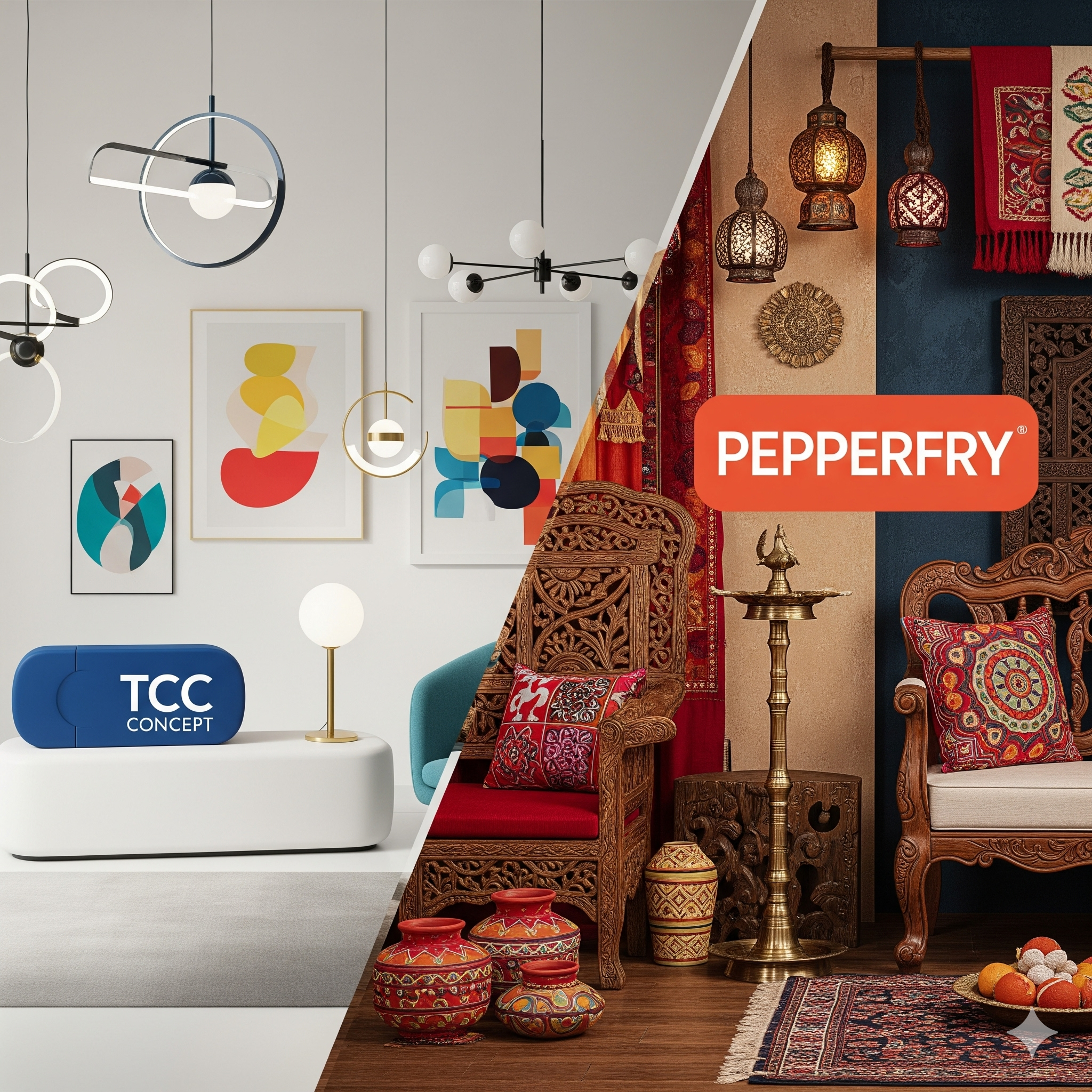Now Reading: TCC Concept to Acquire Pepperfry: A Strategic Leap in India’s E-Commerce and Realty Integration
-
01
TCC Concept to Acquire Pepperfry: A Strategic Leap in India’s E-Commerce and Realty Integration
TCC Concept to Acquire Pepperfry: A Strategic Leap in India’s E-Commerce and Realty Integration

In a move that signals growing convergence between real‐estate services and digital commerce, TCC Concept, a realty-services company based in Pune, has signed a term sheet to acquire up to 100% stake in Pepperfry, the omnichannel furniture and home décor marketplace. The deal, disclosed via a regulatory filing, is yet to reveal its final valuation or the timeline for closing. This acquisition promises to reshape the furniture and home‐goods retail space in India, blending physical real‐estate capabilities with e‐commerce strength.
As competition intensifies among digital marketplaces, including giants like Amazon, Flipkart, and Urban Ladder, TCC Concept’s entry into the e‐commerce and tech platform space via Pepperfry is being viewed as a strategic pivot. This article examines the backgrounds of the two companies, the motivations behind the deal, the challenges Pepperfry has faced, synergy potentials, competitive landscape, and what this could mean for the future of home goods retail in India.
Background: Who Are TCC Concept and Pepperfry?
TCC Concept is a realty services company, headquartered in Pune, which specializes in real estate management, leasing services, and operates flexible office space aggregation under the brand Brantford. For its fiscal year 2025, TCC reported operating revenues of approximately ₹83.2 crore and a net profit of ₹42.1 crore. Pepperfry, founded in 2012, is a well-known omnichannel furniture and home goods platform in India. It operates via both online and offline channels. The company earns most of its revenue via commissions on product sales, competing with Amazon, Flipkart, and Urban Ladder. Over the years, Pepperfry has raised sizeable funding – to the tune of ~$307 million – from investors such as Norwest Venture Partners, Goldman Sachs, GE Pension Trust, Pidilite Ventures, Bertelsmann India Investments, Panthera Growth, and others.
Pepperfry has been scaling its operations, expanding its offline presence, enhancing logistics, and trying to balance growth with profitability. However, in recent years it has encountered headwinds that have affected its growth metrics and financials.

Motivations Behind the Acquisition
The acquisition of Pepperfry by TCC Concept is being framed as a strategic maneuver to strengthen TCC’s presence in the e-commerce and digital marketplace domain, complementing its core focus on real estate and technology-driven platforms. Several motivations appear likely:
- Diversification of business model: TCC is primarily in real estate management and leasing. Acquiring an e-commerce platform gives it a new revenue stream, more aligned with digital and tech‐oriented services.
- Leveraging real-estate assets: TCC likely owns or manages properties which could be re-purposed or better utilized (for warehousing, showrooms, fulfillment centres) to support Pepperfry’s operations, potentially reducing costs and improving logistics.
- Operational synergies: Integrating Pepperfry’s supply chain, logistics, and customer base with TCC’s existing real estate and infrastructure capabilities could lead to improved margins and service levels.
- Capturing growth in home goods: Demand for furniture and home décor remains strong in India, especially via online channels. TCC may see Pepperfry as a fast-track entry into this high-potential market.
- Strategic response to competition: With Amazon, Flipkart, and Urban Ladder pushing hard, this acquisition could be a defensive and offensive move to position TCC in sectors expected to see intense growth.
Pepperfry’s Recent Performance: Challenges and Opportunities
Before the acquisition, Pepperfry has had mixed performance. Key data points:
- In FY24, Pepperfry’s revenue was ₹188.9 crore, reflecting a year-on-year decline of about 30.6%.
- Despite the decline in revenue, its losses have narrowed significantly: losses in the same period dropped by 37.4%, to around ₹117.4 crore.
Challenges contributing to this situation include:
- Leadership disruptions: The sudden death of cofounder Ambareesh Murthy in August 2023 followed by the exit of its then CFO in September 2024 had knocked internal stability. Ashish Shah, the other cofounder, took over as CEO.
- Intensifying competition: Besides Amazon and Flipkart, Reliance-backed Urban Ladder and other players in the furniture/home décor segment have been upping their game. The price wars, logistic costs, and customer expectations put pressure on margins.
- Growth vs profitability trade-off: Pepperfry had earlier planned for an IPO and had converted into a public entity in 2022, preparing for a $250–300 million raise. But eventually deferred the IPO, stating that it would prioritize growth and profitability instead.

At the same time, there are clear opportunities:
- Expanding offline presence (showrooms, delivery/manufacturing logistics) to support omnichannel sales.
- Tapping into increasing consumer demand for premium home goods, especially in tier-2/3 cities, as disposable income grows and consumer tastes evolve.
- Costs rationalization, technology upgrades, and supply chain efficiencies could reduce losses further.
Synergies and Strategic Potential of the Deal
For TCC Concept, acquiring Pepperfry opens several strategic advantages:
- Asset Utilization: TCC’s existing real estate portfolio can serve multiple roles: warehousing, logistics hubs, fulfillment centres, showrooms. This could reduce Pepperfry’s real estate rental or capital expenditure burdens.
- Complementary Capabilities: Pepperfry brings technological platform, supply chain, online marketplace expertise, and customer base; TCC brings physical infrastructure, leasing, property management, and real estate know-how. Together, these can help build a more integrated business model.
- Margin Improvement: By internalizing and optimizing the logistics, fulfillment, and warehousing, Pepperfry may be able to reduce costs, leading to narrower loss margins, or quicker path to profitability.
- Enhanced Customer Experience: Offline-online hybrid models are increasingly appreciated in home goods (seeing furniture in person, trying it, faster returns etc.). TCC’s real estate presence can enable better customer touch points (showrooms, experience centres).
- Financial Backing and Stability: Under TCC’s ownership there may be more stable cash flow, better access to capital (real estate firms often have asset backing), which can allow Pepperfry to invest in growth, tech, supply chain without being hamstrung by immediate financial headwinds.
Risks, Integration Challenges, and Roadblocks
No acquisition comes without risks. Some of the challenges that TCC Concept and Pepperfry will likely face include:
- Valuation and Deal Closure: The filing notes that TCC has signed a term sheet, but the deal size and exact timeline are not yet disclosed. During due diligence, valuation gaps, regulatory approvals, or shareholder objections may delay or dilute the deal.
- Cultural and Leadership Alignment: Pepperfry has seen leadership turnover; integrating into TCC’s organisation will require alignment of management styles, priorities (growth vs profitability), and culture. Misalignment could lead to friction.
- Technology and Platform Integration: Merging systems, supply chains, logistics, customer interfaces, IT infrastructure is complex. There is risk of disruption to service during integration, which could lead to customer dissatisfaction.
- Capital Requirements: Even with TCC’s backing, substantially scaling operations, improving logistics, and expanding offline presence require substantial capital. Ensuring adequate funding without overleveraging will be a challenge.
- Competitive Pressure Intensifies: Customary competitors won’t sit still. Amazon, Flipkart, Urban Ladder and others may double down on discounts, infrastructure investment, or customer incentives, making profit margins tight.

- Macroeconomic & Real-Estate Risks: Real estate cycles, regulatory constraints, and macroeconomic slowdowns can affect TCC’s core business, which might in turn strain its ability to support a capital‐intensive e-commerce venture.
Market Implications & Competitive Landscape
This acquisition is not happening in isolation, but against the backdrop of rapidly evolving e-commerce and home goods markets in India.
- The Omnichannel Trend: Customers increasingly expect a seamless online-offline blend — inspecting furniture in-person, augmented online catalogs, faster delivery. Pepperfry has been operating in this hybrid space. With TCC’s physical footprint, these omnichannel capabilities can get a boost. This could raise the bar for competitors who are purely online or purely brick-and-mortar.
- Push for Profitability among Market Players: Many e-commerce firms in India are shifting focus from growth at all cost to sustainable profitability. Pepperfry has already narrowed its losses. With TCC’s acquisition, the pressure will be on to further improve margins. Competitors will also need to re-assess their models.
- Investment and Funding Environment: Pepperfry raised ~₹43.3 crore in June from existing investors. Overall, its funding has crossed ~$307 million. Post-acquisition, investment community will watch whether TCC can deliver returns and scale Pepperfry profitably. It may also trigger consolidation in the furniture/home décor segment as weaker players seek exits or partners.
- Consumer Dynamics: As disposable incomes rise, urbanization continues, consumer preferences lean toward better quality, design, and experience. Companies that can deliver aesthetic, durable and well-priced home goods with good after-sale service will gain. TCC acquiring Pepperfry might help create bigger scale, better supply chain, potentially better pricing and service.
- Policy & Regulatory Environment: Real estate regulations, land leasing, property laws, import tariffs on furniture, manufacturing incentives will all play a role in shaping how feasible it is to build out offline footprint, warehouses, showrooms etc.
Conclusion
The announcement that TCC Concept is poised to acquire Pepperfry marks a significant moment in India’s e-commerce, home décor, and real estate sectors. For TCC, this is more than a financial transaction — it represents a strategic shift into technology-driven commerce and marketplaces. For Pepperfry, the deal could provide the capital, infrastructure, and stability needed to overcome recent headwinds, sharpen its competitive edge, and accelerate its path to profitability.
However, the success of this acquisition will depend heavily on how well integration is managed, whether synergies are realized without disruptions, and how effectively the combined entity can compete in a market that remains dynamic, price-sensitive, and increasingly demanding in terms of consumer experience.
If TCC Concept succeeds in merging the strengths of real estate (physical infrastructure, property assets, location leverage) with Pepperfry’s marketplace, tech platform, logistics and customer base, the deal may set a template for future consolidation in India’s omnichannel retail sectors. Conversely, failure to align leadership, culture, and customer expectations could limit gains. Ultimately, the legibility, speed, and priorities of execution will decide whether this acquisition becomes a landmark in India’s retail-ecommerce history or just another ambitious but unfulfilled promise.









